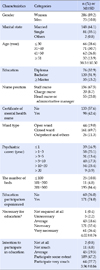1. National Center Mental Health. National mental health statistics. 4th pilot study. . Seoul: Gwangjin;2018. 12. Report No. 11-1352629-000024-01.
2. Kim HJ. Exploration of the experience of work environment in Korean psychiatric nurses working in mental hospitals. Journal of Korean Academy of Psychiatric and Mental Health Nursing. 2015; 24(1):61–72. DOI:
10.12934/jkpmhn.2015.24.1.61.

3. Ju HG, Lee KJ, Kim HS. Effects of human rights sensitivity program on the human rights consciousness and attitudes toward the mental illness by psychiatric mental health nurses. Journal of Korean Academy of Psychiatric and Mental Health Nursing. 2013; 22(3):169–179. DOI:
10.12934/jkpmhn.2013.22.3.169.

4. Shin HJ, Kim KH. Emotional labor and professional quality of life in Korean psychiatric nurses. Health and Social Welfare Review. 2015; 35(4):190–216. DOI:
10.15709/hswr.2015.35.4.190.

5. Lee DE, Suh TW, Lee TK, Park JI, Hong JP, Kwon SH, et al. An estimation of optimal medical manpower in mental hospital. Journal of Korean Neuropsychiatric Association. 2005; 44(5):560–567.
6. Gang HM. Cleaning up patient care?… “Psychiatric hospital workers are hard”. BeMinor. 2016; 07. 07.
7. Hwang J, Bae J. Influence of mental health nurse's moral distress and job satisfaction on turnover intention. Journal of Korean Academy of Psychiatric and Mental Health Nursing. 2017; 26(4):325–332. DOI:
10.12934/jkpmhn.2017.26.4.325.

8. Kim MR, Seomun GA. Relationships among burnout, job satisfaction, organizational commitment and turnover intention to resign in hospital nurses. Korean Journal of Occupational Health Nursing. 2013; 22(2):93–101.

9. Kwon KJ, Chu MS, Kwon JA, Kim JA. The impact of work environment and mood state on job satisfaction among nurses of psychiatric wards. Journal of the Korean Society of Living Environmental System. 2009; 16(3):323–332. DOI:
10.5807/kjohn.2013.22.2.93.
10. Baum A, Kagan I. Job satisfaction and intent to leave among psychiatric nurses: closed versus open wards. Archives of Psychiatric Nursing. 2015; 29(4):213–216. DOI:
10.1016/j.apnu.2015.03.004.

11. Shin SH, Jang KS. The influence of emotional labor strategy on job burnout and job engagement in psychiatric nurses. Korean Public Health Research. 2016; 42(4):33–43.
12. Yang YK. Effects of ego-resilience and work environment on job satisfaction in psychiatric nurses. Journal of Korean Academy of Psychiatric and Mental Health Nursing. 2015; 24(4):226–235. DOI:
10.12934/jkpmhn.2015.24.4.226.

13. Lee HC, Kim YC, Kim KS. Mixed methods research: qualitative research and quantitative research. Gyeonggi-do: Academypress;2013. p. 193.
14. Kim HJ, Kim CN. Review of literatures on focus group method in qualitative study. Keimyung Journal of Nursing Science. 2001; 5(1):1–21.
15. Jang MY, Shin SH. Care burden for mental illness patients, attitude toward mental illness and psychiatric nursing competency in non-psychiatric nurses. Journal of Korean Academy of Psychiatric and Mental Health Nursing. 2017; 26(1):55–66. DOI:
10.12934/jkpmhn.2017.26.1.55.

16. Jang SG. 94% of asylum doctors and nurses experience assaults on patients. Mediatoday. 2016; 07. 08.
17. Alsaraireh F, Quinn Griffin MT, Ziehm SR, Fitzpatrick JJ. Job satisfaction and turnover intention among Jordanian nurses in psychiatric units. International Journal of Mental Health Nursing. 2014; 23(5):460–467. DOI:
10.1111/inm.12070.

18. Kim MY, Ha SJ, Jun SS. The clinical experience of adaptation as novice psychiatric nurses in hospital. Global Health and Nursing. 2018; 8(1):17–28. DOI:
10.35144/ghn.2018.8.1.17.

19. Jordan TR, Khubchandani J, Wiblishauser M. The impact of perceived stress and coping adequacy on the health of nurses: a pilot investigation. Nursing Research and Practice. 2016; 2016:1–11. DOI:
10.1155/2016/5843256.

20. Koekkoek B, van Baarsen C, Steenbeek M. Multidisciplinary, nurse-led psychiatric consultation in nursing homes: a pilot study in clinical practice. Perspectives in Psychiatric Care. 2016; 52(3):217–223. DOI:
10.1111/ppc.12120.

21. Tsaras K, Daglas A, Mitsi D, Papathanasiou IV, Tzavella F, Zyga S, et al. A cross-sectional study for the impact of coping strategies on mental health disorders among psychiatric nurses. Health Psychology Research. 2018; 6(1):9–15. DOI:
10.4081/hpr.2018.7466.

22. Noh D, Kim S, Kim S. Moral distress, moral sensitivity and ethical climate of nurses working in psychiatric wards. Journal of Korean Academy of Psychiatric and Mental Health Nursing. 2013; 22(4):307–319. DOI:
10.12934/jkpmhn.2013.22.4.307.

23. Bae JH, Kang WS, Paik JW, Kim JW. Changing trends in the occurrence and management of delirium for 5 years in a university hospital. Korean Journal of Psychosomatic Medicine. 2012; 20(2):112–119.
24. Kim M. A study on a psychiatric nurse's mannerism experiences. Journal of Korean Academy of Psychiatric and Mental Health Nursing. 2017; 26(3):301–312. DOI:
10.12934/jkpmhn.2017.26.3.301.

25. Kurjenluoma K, Rantanen A, McCormack B, Slater P, Hahtela N, Suominen T. Workplace culture in psychiatric nursing described by nurses. Scandinavian Journal of Caring Science. 2017; 31(4):1048–1058. DOI:
10.1111/scs.12430.

26. Lee SN, Yoo EK. A phenomenological study on experience of clinical supervision by psychiatric mental health nurse practitioners. Journal of Korean Academy of Psychiatric and Mental Health Nursing. 2017; 26(2):174–185. DOI:
10.12934/jkpmhn.2017.26.2.174.

27. Lee SH, Lee EJ. Influence of nurses' critical thinking disposition and self-leadership on clinical competency in medium sized hospitals. Journal of Korean Clinical Nursing Research. 2018; 24(3):336–346. DOI:
10.22650/JKCNR.2018.24.3.336.







 PDF
PDF ePub
ePub Citation
Citation Print
Print







 XML Download
XML Download